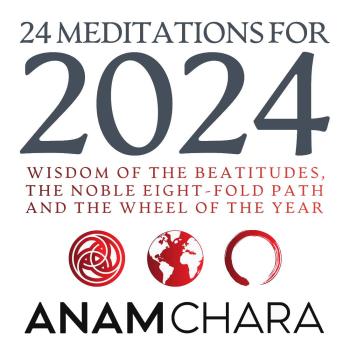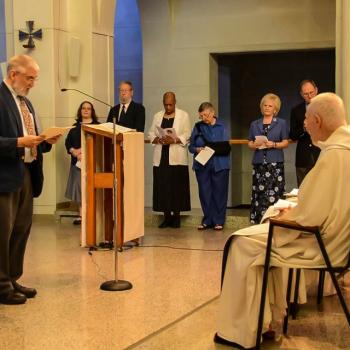
Recently a reader left the following comment on this blog:
I have been reading and tried to practice the way of a contemplative life although poorly I believe. But my hunger for anything on the topic of contemplation continues. Recently I have also been enticed into “mindfulness” practices. Now what or how do you relation contemplation and Mindfulness? They’re beginning to sound that there is a correlation? Thank you!
Thanks for your comment. First of all, we are all “poor” when it comes to contemplation; it is the human condition to have distracted minds, unruly emotions, and fidgety bodies; our fast-paced, hi-tech, entertainment-besotted culture generally makes it worse. So please be gentle with yourself. When you enter your time for silence in the presence of God, seek to be gentle, to relax, to rest in the unseen presence.
Allow every distracting thought and emotion which arises within you to be simply another reminder that you seek the silence and the rest which lies deeper within. There’s an old joke that the princess has to kiss a lot of frogs before she finds her prince — likewise, contemplatives have to gently turn away from many distractions before we find rest in the silence.
Mindfulness comes from a Pali word, sati, which means “mindfulness” or “awareness” and points to an important concept within Buddhist meditation practice — indeed, “right mindfulness” is the seventh of the Buddha’s Noble Eightfold Path. So in a general sense, mindfulness (awareness) is simply a foundational element of a meditation practice: awareness, clarity, attentiveness, these are the core elements of mindfulness.
It implies waking up from the web of distractions that normally cloud human consciousness, so that we may engage with life from a place of intentional, “being present” to what simply and truly is, rather than remaining lost in the funhouse of our never-ending internal commentary and criticism of what we experience.
So, while it has a Buddhist provenance, mindfulness in this sati sense is simply a positive quality that emerges from any kind of disciplined meditation practice (and Christian contemplation or silent prayer does qualify as a meditation practice). But I suspect when you speak of mindfulness, you may be referring to the secularized meditation/wellness practice called “Mindfulness Based Stress Reduction” or MBSR, which was developed by Jon Kabat-Zinn at the University of Massachusetts Medical School in the 1970s.
Kabat-Zinn is a student of Buddhism, but it’s my understanding that MBSR explicitly intends to be a non-religious practice, aimed at mental and physical well-being. I’ve only taken one MBSR class, and was taught several practices, including a generic type of meditation, some gentle yoga postures, meditative walking, and “body scanning” (a relaxation technique involving paying attention in a gentle way to each part of the body while sitting or lying down). It’s my understanding that this has become a hot topic in research circles, looking for measurable benefits that MBSR practice can provide to people who suffer from chronic pain, anxiety, depression, or other concerns.
There’s a kind of trendiness to mindfulness practices. And naturally, that has led to a bit of backlash, too. The Spectator in the United Kingdom recently ran an article by Melanie McDonagh called Mindfulness is Something Worse Than Just a Smug Middle Class Trend. It’s well worth reading. Here’s a snippet for you:
An important element of the practice is to eschew judgmentalism; to observe and accept ourselves and our surroundings with compassion. Which sounds dandy, except that there are some things about ourselves and our situation which we jolly well shouldn’t be non-judgmental about, which we should be trying to change… This brings me to what really annoys me about being mindful, which is that as far as I can gather, it’s Mostly About Me. Sitting concentrating on your breathing is a good way to chill out and de-stress, but it’s not a particularly good end in itself. Radiating compassion is fine, but it doesn’t obviously translate into action. Where’s the bit about feeding the hungry, visiting the prisoner, all the virtues that Christianity extols? Where in fact is your neighbour in this practice of self-obsession? … Mindfulness may be the new religion — but it’s no substitute for the old one.
Is she being a bit unfair? You can decide for yourself. But I can tell you, she’s not the only one who worries about this. In fact, I first ran into criticism of the mindfulness movement from Buddhists, who were concerned that it was a “dumbing down” of Buddhism that gave consumeristic Americans a handy little practice for feeling good, but without the ethical and transformational demands of the Buddha’s teachings.
Christians, likewise, recognize that silent prayer needs to be embedded in an entire life oriented to being more Christ-like: in other words, the proof of our spiritual maturity lies not in how good our silent prayer is, but in how good our actions are.
But let me hasten to say that I am hesitant to simply say I agree with McDonagh and that the mindfulness fad is bad news. I don’t go that far, because I do believe MBSR really does have health & wellness benefits. Here’s how I see it: secular mindfulness practices are good, Buddhist and other eastern meditation practices are better, and theo-centric (God-centered) contemplative practices (like Christian silent prayer) are the best of all.
Why do I make this claim? In silent prayer, we seek not only wellness (the purpose of MBSR) and enlightenment (the aim of eastern meditation), but also intimacy with God.
Granted, I am writing as a Christian, with a Christian world-view, and others are free to disagree with me. But what I love about Christian spirituality is that I’m never alone: I’m always invited into the presence of Unconditional Love, who is not just a “force” but a Person. I enter silence because God loves me and because intentional, prayerful silence is a way to respond to that love (Psalm 46:10) and even a way to praise that love (Psalm 65:1).
It’s also about becoming a more Christ-like person, which means a holy person, or at least someone who seeks to be holy. It means self-emptying, or kenosis. It means entering silence not merely as a means of self-help or personal growth, but in the interest of an ever-deepening relationship — with God, with Love.
But wellness is good, and MBSR is a wonderful way to use meditation and other relaxation/awareness practices in the service of wellness. Likewise, the quest for enlightenment or illumination is good, and eastern spiritual practices like shamatha or zazen are great tools in the service of that kind of spiritual growth or even liberation. What I love about Christian silent prayer — contemplation — is that it includes all of the above, but goes even further, in that it is grounded not just in wellness or in personal enlightenment, but in union with God — union with Divine Love. That’s what keeps me returning to the silence every day.
Thanks for your question. And enjoy your journey!
Enjoy reading this blog?
Click here to become a patron.

















